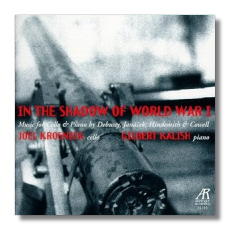
The Internet's Premier Classical Music Source
Related Links
- Latest Reviews
- More Reviews
-
By Composer
-
Collections
DVD & Blu-ray
Books
Concert Reviews
Articles/Interviews
Software
Audio
Search Amazon
Recommended Links
Site News
 CD Review
CD Review
In the Shadow of World War I

- Claude Debussy: Sonata for Cello and Piano
- Henry Cowell: Sonata for Cello and Piano
- Leoš Janáček: Fairy Tale
- Paul Hindemith: Sonata for Violoncello and Piano, Op. 11
Joel Krosnick, cello
Gilbert Kalish, piano
Arabesque Z6709
Like In the Shadow of World War II, the previously released companion CD by Joel Krosnick and Gilbert Kalish, this CD has an ostensible unifying purpose. The four pieces were all written in a nine-year period surrounding World War I (1910-1919). Is that enough? Maybe. Do they have similar styles? #Themes? Not really. What really unites them is that they are all marvelous cello pieces that deserve more attention than they've gotten.
According to the booklet notes, the performers included Debussy's Sonata for Cello and Piano (1915) partially because of the composer's Francophilia in the face of the ravaging "Boches." Within highly refined passages and extreme condensation, Kalish finds "vividness touched with tragedy, an exaggeration of emotion, love, and longing." What also emerges is bizarre wit and unpredictable gestures, lushly garlanded paths that lead nowhere, and a snappy taunting coda.
Krosnick's cello playing in the delicious Janáček Fairy Tale ("Pohadka") is superb. He performs with less legato than Gary Hoffman did in last year's release of the CD Leoš Janáček (EMI 55585 2 7), reviewed in the CLASSICAL disCDigest (Volume 5, #7, Issue 21). The current version weighs in at 11:20 minutes, as opposed to the earlier one's 13:40. The music therefore sounds more urgent and less sentimental, perhaps commenting on a passing era when fairy tales were possible. Could its underlying dreamy nature, braced against odd tonalites, suggest a calm before a storm?
Paul Hindemith's Sonata for Violoncello and Piano is a nasty piece of work. Its sour key changes in the middle of the first movement, coupled with a percussive piano that – more than the other pieces on this CD – sounds like rapid gunfire. It is not, however, programmatic about war, in the same way as Shostakovich's Seventh Symphony is. Instead, it captures the disillusion of a young man who cursed "this stupid breed of idiots [who] never put an end to this devilish war." Instead, it captures the disillusion of a young man who cursed "this stupid breed of idiots [who] never put an end to this devilish war." Themes that begin almost playfully end obsessively, stridently. There is no respite in the Langsam, only brief snatches of lyricism perching on a rusty spring, soon to release in the furiously dissonant final movement. It is the musical equivalent of the New Objectivity paintings of Hindemith's contemporaries, George Grosz and Otto Dix.
Henry Cowell is the only American on this CD. Krosnick found enough fragments of his Sonata for Cello and Piano (1915) in the Library of Congress to put together a working version. It is a charming youthful work, dotted with country dances, popular tunes, even the "fate" motive from Bizet's Carmen. What it's doing in a collection about World War I is anyone's guess, unless it demonstrates America's blithe isolationism. But I'm glad they included it. A brash anomaly, it plays Ivesian pranks on the listener. It flagrantly refuses to follow the musical rules of development. Listen and wonder: how many more unknown works are languishing in a Library of Congress file cabinet?
Copyright © 1999, Peter Bates


















